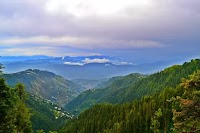Rohtas - yet another historical landmark of Pakistan built in the 16th century by none other than the mastermind of the Grand Trunk Road - Sher Shah Suri, the then Muslim ruler of India. However due to its distant and off the main road location, many a tourist forget to visit this gigantic and huge infrastructure spread over a circumference of 4 kilometres. The approach road to Rohtas is just 3 kilometres short of Dina, a small town ahead of Jhelum on Lahore - Islamabad Road. From the main GT Road, Rohtas is only 8 kilometres away, located south-west of Dina town. Previously this approach was restricted in fairly dry weather in the absence of a bridge over the Kahan River - in fact the absence of any bridge over the river kept the tourists away from this historical fort.
 Now with the construction of a bridge, the approach to this massive rock structure is a matter of minutes. The fort lies 320 58' N and 730 34' E and is about 4 kilometres in circumference. The fort was built mainly to block re-entry route of the deposed Mughal emperor Humayun who had fled to Iran after his defeat at battle of Chausa, to intimidate the local Ghakkar tribes, who were friends of the Mughal and also as a military base. The work started in 1541 AD and completed in 9 years. There are many estimates in various scripts as far its cost of construction is concerned. Some place it around Rs. 3,425,000, while a Persian script puts the cost of construction and maintaining an army at around Rs. 110,107,975. At one place it says that one gold coin ("Ashraffi") was given for each brick that was placed.
Now with the construction of a bridge, the approach to this massive rock structure is a matter of minutes. The fort lies 320 58' N and 730 34' E and is about 4 kilometres in circumference. The fort was built mainly to block re-entry route of the deposed Mughal emperor Humayun who had fled to Iran after his defeat at battle of Chausa, to intimidate the local Ghakkar tribes, who were friends of the Mughal and also as a military base. The work started in 1541 AD and completed in 9 years. There are many estimates in various scripts as far its cost of construction is concerned. Some place it around Rs. 3,425,000, while a Persian script puts the cost of construction and maintaining an army at around Rs. 110,107,975. At one place it says that one gold coin ("Ashraffi") was given for each brick that was placed.

Search This Blog
Popular Posts
 Admin
Admin
 Admin
Admin
National Parks of Pakistan
September 21, 20140
 Admin
Admin
Satpara Lake Skardu Gilgit-Baltistan
November 25, 20130
* We promise that we don't spam !
Footer Copyright
All Right Reserved Copyright © 2022
#buttons=(Accept !) #days=(20)
Our website uses cookies to enhance your experience. Click here to Learn More
Accept !


